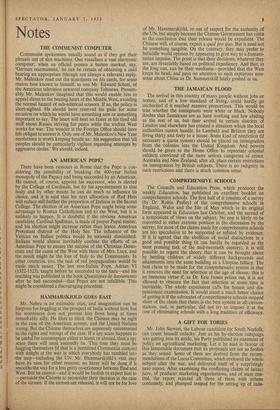COMPREHENSIVE SCHOOLS The Councils and Education Press, which produces the
weekly Education, has published an excellent booklet on comprehensive schools. The first half of it consists of a survey (by Dr. Robin Pedley) of the comprehensive schools in England, Wales and the Isle of Man which in its original form appeared in Education last October, and the second of a symposium of views on the subject. No one is likely to be converted to either extreme position in the discussion by the survey, for most of the claims made for comprehensive schools are too speculative to be supported or refuted by evidence. If it is agreed that the abolition of social distinctions is a good and possible thing (it can hardly be regarded as the most pressing task of the mid-twentieth century), it is still possible to regard the theory that it can be brought about by herding children of widely different backgrounds and attainments into the same building as a Utopian fallacy. The best claim to be made for the comprehensive system is that it removes the need for selection at the age of eleven; this is an immense virtue if, as Dr. Eric James points out, it is not allowed to obscure the fact that selection at some time is inevitable. The whole experiment calls for honest and dis- passionate examination. It would stand a much better chance of getting it if the advocates of comprehensive schools stopped short of the claim that theirs is the best system in all circum- stances, and, in particular, did not try to impose it at the cost of eliminating schools with a long tradition of efficiency.














































 Previous page
Previous page